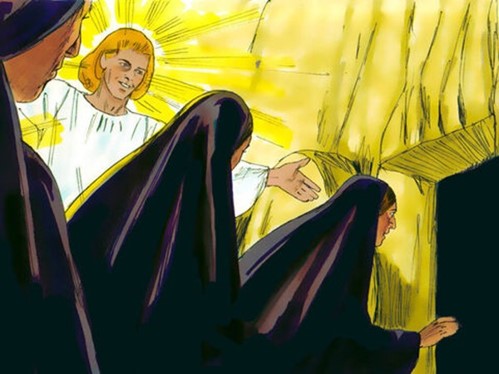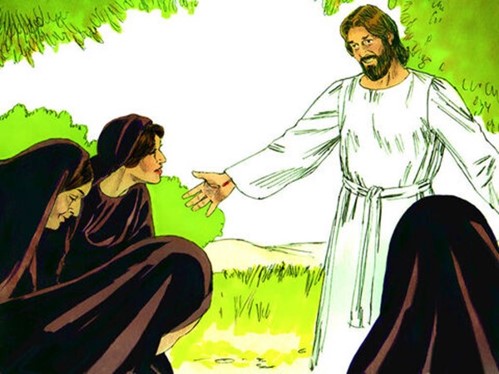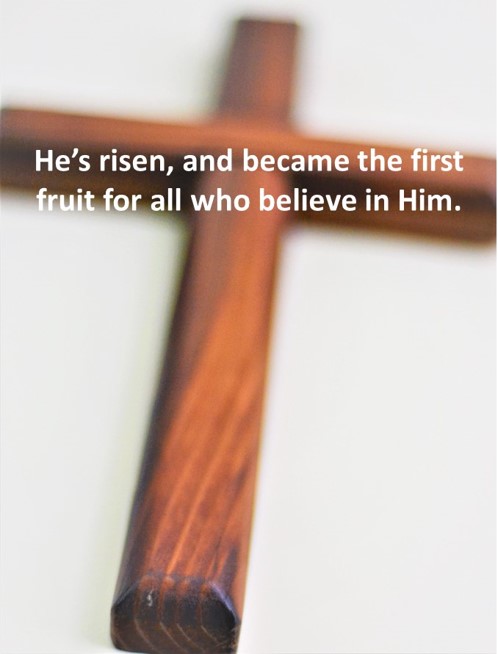Jesus is risen! He is risen indeed!!!
Greetings in the name of the Father, the Son, and the Holy Spirit. Happy Easter to all of you.
But Christ has indeed been raised from the dead, the firstfruits of those who have fallen asleep. For since death came through a man, the resurrection of the dead comes also through a man. For as in Adam all die, so in Christ all will be made alive. (1 Corinthians 15:20-22)

On that first resurrection morning, the air was thick with anticipation and confusion. As the first light of dawn crept across the Jerusalem skyline, Mary Magdalene made her solitary way to the tomb where Jesus had been laid. Her heart, heavy with grief, could not have been prepared for the sight that awaited her. The stone, a formidable barrier to the resting place of the crucified Christ, had been rolled away, leaving the tomb exposed and eerily empty.
As Mary stood there, the cool morning air swirling around the empty sepulcher, her confusion turned to astonishment. The linen wrappings lay discarded, the body they once held nowhere to be found. Panic-stricken, she ran to find Peter and John, her mind racing with questions and fear. How could it be that Jesus’ body was gone? Who could have taken it, and why?
This scene of bewilderment and awe at the empty tomb encapsulates the incredible moment that forever altered the course of human history. The resurrection of Jesus Christ from the dead is the cornerstone of Christian faith, representing the ultimate victory over death and sin. It’s a pivotal event that not only demonstrated Jesus’ divine power but also offered hope and redemption to a fallen world. In this moment of divine intervention, the despair of the crucifixion was transformed into the triumph of resurrection, promising eternal life and salvation for all who believe.

The Reality of the Resurrection
On a calm morning in Jerusalem, the garden tomb, where Jesus was laid after His crucifixion, stood silently, its entrance sealed by a heavy stone. Yet, what occurred at this tomb would forever change the fabric of history and the hearts of countless individuals. As dawn broke, Mary Magdalene arrived to find the stone rolled away and the tomb empty, a scene that vividly captures the essence of the resurrection’s reality.
The narrative in John 20:1-18 is more than a historical account; it’s a transformative revelation. The empty tomb serves as a silent yet powerful witness to the victory over death. The shock and joy of the disciples, upon realizing that Jesus had risen, underscore the profound impact of this event. Their transformed lives, from fear and despair to bold proclamation and joy, further attest to the resurrection’s authenticity and power.
Paul’s discourse in 1 Corinthians 15:14-17 anchors the resurrection as the linchpin of Christian faith, stating its indispensability for the validity of Christian belief and practice. He argues that without the resurrection, the Christian faith is in vain, but affirms triumphantly that Christ has indeed been raised, validating the hope and assurance of believers.
And if Christ has not been raised, our preaching is useless and so is your faith. More than that, we are then found to be false witnesses about God, for we have testified about God that he raised Christ from the dead. But he did not raise him if in fact the dead are not raised. For if the dead are not raised, then Christ has not been raised either. And if Christ has not been raised, your faith is futile; you are still in your sins. (1 Corinthians 15:14-17)
The resurrection signifies the defeat of death and the possibility of new life. This event is not just an article of faith but a historical reality with personal and cosmic implications. It’s an invitation to encounter the living Jesus, to experience the transformative power of His resurrection personally.
The resurrection story resonates with themes of hope, renewal, and transformation. It’s about the breaking in of God’s kingdom into the temporal realm, offering a foretaste of eternal life. This narrative invites us to move beyond mere intellectual assent to an experiential encounter with the risen Christ, challenging us to let this truth transform our lives, relationships, and worldviews.
In embracing the resurrection, we are invited into a story of divine love and power, where death is overcome, and eternal life is inaugurated. This reality encourages us to live with hope, act with courage, and love with the sacrificial love of Christ. It beckons us to see our world and our lives through the lens of this transformative event, allowing the truth of the empty tomb and the risen Lord to shape our existence and guide our steps.
Thus, the resurrection of Jesus is not just a past event to be celebrated but a present reality to be lived. It calls us to a life marked by the hope of the resurrection, characterized by victory over sin and death, and propelled by the transformative power of the risen Christ. Through the resurrection, we are offered a new perspective on life, where every moment is infused with eternal significance and every action is an opportunity to reflect the victory and peace of the risen King.

Victory Over Death
In the narrative of Jesus’ resurrection, we encounter the profound truth that death, the ultimate adversary of humanity, has been decisively defeated. This victory is not just a theological assertion but a reality that transforms the human experience of life and death. The resurrection of Jesus is a cornerstone event that reshapes our understanding of mortality, imbuing life with new meaning and hope.
Romans 6:9 proclaims, “Death no longer has mastery over him.” This statement encapsulates the victory of Jesus over death—a triumph that is not limited to Him alone but extends to all who believe in Him. Through His resurrection, Jesus shattered the stronghold of death, nullifying its power and altering its finality. Death, once a dreaded end, has become a gateway to eternal life for those in Christ.
The implications of Jesus’ victory over death are monumental. It reassures us that our earthly demise is not the end of our existence but a transition to a life that is eternal and impervious to decay. This perspective fundamentally changes how we live, love, and interact with our transient world. The fear of death, which often constrains and controls human behavior, loses its grip in the face of the resurrection’s promise.
Furthermore, Jesus’ triumph over death is a testament to God’s absolute sovereignty and power. It confirms the hope of resurrection for all who trust in Christ, promising a future where death is no longer a threat but a conquered enemy. This hope is not abstract or theoretical but a tangible assurance that sustains believers through life’s trials and tribulations.
In living with the reality of Jesus’ victory over death, believers are called to a life characterized by hope, courage, and purpose. They are empowered to face life’s uncertainties and challenges with the conviction that in Christ, the ultimate victory has already been achieved. This assurance enables Christians to live fully in the present, engaging with the world with compassion, boldness, and a profound sense of mission.
The resurrection also offers a foretaste of the redeemed creation, where death and decay will have no place. It invites believers to work towards a world that reflects the resurrection’s life-giving power, championing values of justice, peace, and holistic well-being. In this way, the victory over death is not only a future expectation but a present reality that motivates and shapes the believer’s engagement with the world.
In summary, the victory of Jesus over death is a central tenet of Christian faith that offers both a future hope and a present reality. It challenges the fear and finality traditionally associated with death, replacing them with the assurance of eternal life and the empowering presence of the resurrected Christ. Believers are thus called to live in the light of this victory, embodying the resurrection’s transformative power in their daily lives and communities, and proclaiming the hope of the gospel to a world in need of its liberating truth.

Liberation from Sin
The resurrection of Jesus Christ is a pivotal event that signifies not only the defeat of physical death but also the comprehensive liberation from sin. This victory over sin is a fundamental aspect of the Christian faith, heralding a new era where forgiveness and new life are accessible to all who believe.
The death and resurrection of Jesus represent the ultimate sacrifice for sin, fulfilling the requirements of divine justice and demonstrating God’s immense love for humanity. Through this sacrificial act, the chains of sin that bound humanity were broken, offering a way to be reconciled with God. In Romans 6:4, Paul eloquently captures this transformative reality: “just as Christ was raised from the dead through the glory of the Father, we too may live a new life.” This verse underscores the profound connection between Jesus’ resurrection and the believer’s experience of new life, emphasizing that the same power that raised Christ from the dead is at work in those who believe, enabling them to live in righteousness.
The liberation from sin through Jesus’ resurrection means that believers are no longer enslaved to sin’s destructive patterns and consequences. Instead, they are free to pursue a life of holiness, guided by the Holy Spirit and grounded in the redemptive work of Christ. This new life in Christ is marked by a transformative process, where the believer’s old self, with its sinful inclinations and behaviors, is progressively replaced by a new self, created to be like God in true righteousness and holiness.
You were taught, with regard to your former way of life, to put off your old self, which is being corrupted by its deceitful desires; to be made new in the attitude of your minds; 24 and to put on the new self, created to be like God in true righteousness and holiness. (Ephesians 4:22-24)
Furthermore, this liberation from sin is not a one-time event but an ongoing journey of sanctification, where believers are continually being made into the likeness of Christ. It involves daily choices to resist sin and live according to God’s righteous standards. The power of the resurrection equips believers to overcome sin’s temptations and live victoriously, reflecting the holiness and purity of Jesus in their thoughts, words, and actions.
In living out this liberation from sin, believers become beacons of hope and agents of change in a world still marred by sin and brokenness. They are called to embody the values of the Kingdom of God, promoting justice, love, and peace, and to participate in God’s redemptive mission to restore all creation.
In summary, the resurrection of Jesus is the cornerstone of the believer’s victory over sin, offering not only forgiveness but also the power to live a transformed life. This liberation from sin is an integral part of the Christian experience, enabling believers to grow in holiness, live out the values of God’s Kingdom, and anticipate the complete restoration that will come when Christ returns. Through the resurrection, believers are invited to experience and manifest the transformative power of God’s love and righteousness in their lives and in the world.
Summary
The resurrection of Jesus Christ transcends its historical context, standing as a vibrant, ongoing reality that infuses our lives with new life and hope. This monumental event is the bedrock of Christian faith, signifying the ultimate triumph over death and sin. It’s not merely a past occurrence but a dynamic force that shapes our present and future, offering a foundation for a life radically transformed by God’s power.
This victory through the resurrection is central to Christian belief, providing more than historical validation of Jesus’ divine nature; it offers a tangible experience of renewal and freedom. Believers are called to internalize and live out this victory, allowing it to permeate every facet of their existence. The transformative power of the resurrection is not confined to the Easter season but extends to every moment of our lives, serving as a source of strength and empowerment. It compels us to confront challenges and temptations with the assurance of Christ’s victory, deepening our relationship with God and shaping our interactions with others.
As we carry the message of the resurrection forward, it should invigorate our daily walk, infusing our actions, decisions, and relationships with the reality of Jesus’ victory over death and sin. This message is not only for the Easter season but is a vital truth to be embraced and lived out throughout the year.
In closing, the call to embrace the resurrected life is universal, extending to all, whether newcomers to the faith or long-standing believers. Everyone is invited to explore and experience the profound change that Jesus’ victory over death and sin can bring into their lives. Let the truth of the resurrection linger in our minds and hearts, offering hope, direction, and the promise of transformation, today and always. This enduring message of the resurrection should be a wellspring of empowerment, guiding us to lead lives marked by victory, freedom, and divine purpose.
Let us pray:
Heavenly Father, we stand in awe of the power of Your Son’s resurrection, which broke the chains of death and sin. We thank You for the victory and freedom it brings to our lives. Help us to live daily in the reality of this transformation, reflecting Your love and righteousness in our actions and relationships.
Guide us in deepening our faith through prayer, study of Your Word, and fellowship with other believers. Empower us to serve others and share the message of hope and new life found in the resurrection of Jesus Christ.
May the truth of Your Son’s victory over death empowers us to live with courage, joy, and peace, overcoming challenges and temptations through His strength. Let our lives be a testament to the transformative power of Your love and grace.
In Jesus’ name, we pray, Amen.

For I am convinced that neither death nor life, neither angels nor demons, neither the present nor the future, nor any powers, neither height nor depth, nor anything else in all creation, will be able to separate us from the love of God that is in Christ Jesus our Lord. (Romans 8:38-39)
